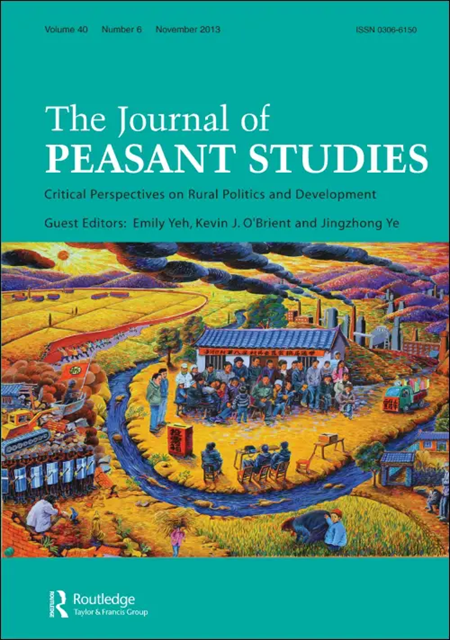Rubber, rights and resistance: the evolution of local struggles against a Chinese rubber concession in Northern Laos
IF 4.4
1区 社会学
Q1 ANTHROPOLOGY
引用次数: 74
Abstract
Over the past 10 years, transnational land grabs for rubber tree plantations have proliferated across Laos. Plantation concessions are being established on village lands that are represented as ‘degraded’ and legally classified as ‘state forests’, expropriated by government officials in the name of poverty alleviation with promises that plantations will provide new wage labour opportunities for those dispossessed. This contribution examines the evolution of various forms of resistance by a small, ethnic-minority Khmu community against a Chinese-owned rubber concession awarded on over half of their territory. Villagers combined different tactics of resistance to undermine the concession, including anonymous acts of sabotage, refusal to work for the company, identification of powerful allies in the government and civil society, and recourse to law and state institutions. They also appropriated the dominant state development ideology as a strategic representation to assert their territorial claims. By working within state structures rather than by open confrontation, the Khmu have stalled the establishment of the plantation on their lands. Khmu resistance to the concession evolved in response to shifting experiences of injustice and perceptions of risk and opportunity, and is one of many examples of resistance that are erupting in response to land deals across Laos.橡胶、权利和抵抗:老挝北部反对中国橡胶租界的当地斗争的演变
在过去的10年里,跨国抢夺橡胶树种植园的现象在老挝各地激增。政府官员以扶贫的名义征用了被称为“退化”、在法律上被归类为“国有森林”的村庄土地,并承诺种植园将为那些被剥夺土地的人提供新的带薪劳动机会。这篇文章考察了一个小的少数民族克木社区对中国拥有的橡胶特许权的各种形式的抵抗的演变,这些特许权被授予了超过一半的领土。村民们结合了不同的抵抗策略来破坏特许权,包括匿名破坏行为,拒绝为公司工作,在政府和公民社会中寻找强大的盟友,以及诉诸法律和国家机构。他们还把占主导地位的国家发展意识形态作为维护其领土要求的战略代表。通过在国家结构内工作而不是公开对抗,克穆人已经阻止了在他们的土地上建立种植园。Khmu人对租界的抵制是对不公正经历的转变以及对风险和机会的看法的回应,这是老挝各地爆发的反对土地交易的许多例子之一。
本文章由计算机程序翻译,如有差异,请以英文原文为准。
求助全文
约1分钟内获得全文
求助全文
来源期刊

Journal of Peasant Studies
Multiple-
CiteScore
10.50
自引率
17.60%
发文量
99
期刊介绍:
A leading journal in the field of rural politics and development, The Journal of Peasant Studies (JPS) provokes and promotes critical thinking about social structures, institutions, actors and processes of change in and in relation to the rural world. It fosters inquiry into how agrarian power relations between classes and other social groups are created, understood, contested and transformed. JPS pays special attention to questions of ‘agency’ of marginalized groups in agrarian societies, particularly their autonomy and capacity to interpret – and change – their conditions.
 求助内容:
求助内容: 应助结果提醒方式:
应助结果提醒方式:


